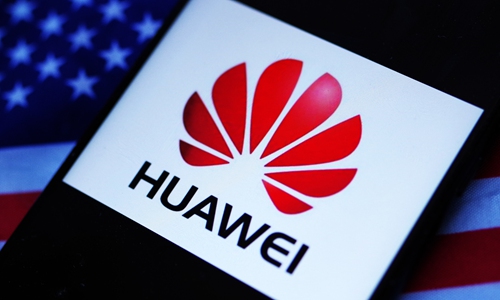Washington's attack on Huawei set to prolong US economic recession
By Wen Sheng Source:Global Times Published: 2020/5/23 19:26:49

Huawei Photo:IC
As the clock ticks quickly toward November 3, the Trump administration, mired in the results of its messy response to COVID-19, is reigniting a tussle with China in a desperate attempt to deflect its dereliction of duty. It has now banned Huawei from purchasing semiconductor chips that are made using any US technology, such as technologies by TSMC and Samsung.
By relentlessly assaulting Huawei and following his new election playbook of smearing China, Trump hopes to sit for another four years in the White House.
Huawei is the world leader in 4G and 5G and one of China's most promising technology companies. It should not be crushed by the political palm of the US government.
Beijing has openly said that it will use all necessary means to safeguard the high-tech Chinese firm's rights and interests. Reliable sources told the Global Times that authorities are set to make strong counterattacks against some top US companies, placing them on a trade blacklist and restricting or stopping their sales in China.
Simply put, the White House wants to win a couple of political points by choosing to escalate a technology war with China. China should not let Washington get its way. By striking back hard at major American chip, electronic device and aircraft makers, China can bring economic pain to the US by exacerbating and prolonging its current recession.
Much of what the Trump administration has been doing to ratchet up an economic showdown with China will prove self-defeating for the US economy. Trump's re-election prospects are becoming increasingly bleaker due to his disastrous bungling of the US COVID-19 response and his senseless trade war. The coupling of the two sins is highly likely to upend his pursuit of a second term.
Huawei's achievements in 4G and 5G are attributed to the enterprise's steadfast and painstaking efforts in telecommunications and information technology research and development. It did not steal anything from the US. Due to a myriad of 2G and 3G standards embraced by Qualcomm and the now defunct Motorola and Lucent, US firms began to lose ground to European and Chinese ventures in developing faster mobile broadband technology, represented by 4G and 5G.
Cutting off Huawei's semiconductor supplies just because there isn't a single US company that can now compete with it is a sinister move. That is what most angers the Chinese public, which has lately called for a boycott of American products and services.
On May 22, the US government, again, placed 33 Chinese firms, institutions and enterprises on an economic blacklist, alleging they have nurtured tie-ups with China's military. But, obviously, the move represents the US firebrand politicians' pattern of thinking -- that they must pummel all Chinese technology upstarts because they will endanger America's tech supremacy.
The White House's move to impose a sweeping ban on Huawei's supplies threatens to delay the rollout of ultrafast 5G wireless networks globally, as the company is now the world's largest telecoms equipment manufacturer. Huawei equipment, devices and services are used by 4.8 billion people all over the globe.
It is no wonder that Huawei has condemned the US government for being "arbitrary and pernicious." In the long run, the Trump administration's attack on Huawei will destroy the trust and cooperation within the global semiconductor sector, which many industries rely on. It will increase conflict and wreak havoc on these industries.
It remains to be seen how the saga will unfold, but the tech conflict's adverse economic impacts will worsen the pain currently felt by the US. The country's deteriorating COVID-19 crisis is being worsened by Trump's blind push to reopen the economy and will lead to a flare-up in infections and fatalities.
China will, according to a report, invest an estimated $1.4 trillion over six years until 2025 in high technologies including high-speed internet, industrial robotics, artificial intelligence, quantum computing as well as modern weaponry and defense systems.
Although the US is trying to contain China's technology advances, a flotilla of Chinese companies, including Huawei, Alibaba and Tencent, could join in hands with counterparts in Europe and Asia to explore new realms of science and technology. As China's huge market continues to grow and open to them, they could collectively reap the economic benefits of their innovations.
The author is an editor with the Global Times. bizopinion@globaltimes.com.cn
Posted in: INSIDER'S EYE